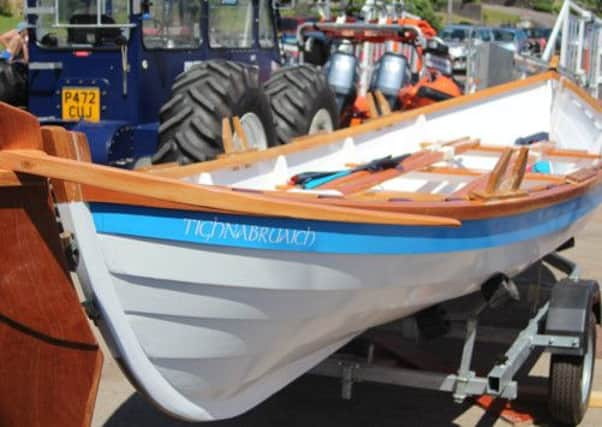Coastal rowing is growing in popularity in Scotland


A skiff is a traditional coastal rowing boat, similar to that used all over northern Europe for generations, with a crew of four and a cox. Four years ago a prototype of a classic boat, a St Ayles Skiff, was designed by boat builder Alec Jordan in Fife for a Scottish Fisheries Museum project designed to revive the art of coastal rowing races popular in East Fife, where miners would make their own boats from salvaged timber. He had the idea of creating a kit boat, available to communities who could build their own boats with a view to racing them.
The idea took off; within six months, the first regatta was held with six boats. Community after community raised the £3,500 or so it costs for the kit and the materials to start building their own version and a World Championship was held in Ullapool in July where the 49th and 50th boats were launched, all hailing from the north-east of England or Scotland.
Advertisement
Hide AdMy own local team, Kyles Coastal Rowing, was the 48th to launch, the culmination of months of hard work by a group of villagers based in Tighnabruaich. The boat taking shape in an empty shop in the village had aroused interest, not least in how they were going to manoeuvre it out as the finished articles are 22 feet long and weigh 185kg. The team building it were made up of businessmen, hoteliers, retirees and the minister, some with practical experience of boats, some without.
This is fairly typical, according to Robbie Wightman, the convener of the Scottish Coastal Rowing Association. “You don’t need to be a boat builder. The kits are designed to be easy enough, although having a joiner around is useful.”
The money needed to buy the kit and materials plus essentials like a trailer and life jackets is raised in many different ways, according to Wightman. “Some communities just share the cost. Others use a variety of local grants, although South Queensferry got a lottery grant. Then there are the usual coffee mornings and fundraisers.”
The boats, he says, are perfect for their purpose. “You don’t need to be an expert to row one, in fact some of the slidey-seat rowing professionals aren’t the best rowers when it comes to a skiff.” He points to the design of the boats, too, which are undeniably beautiful and says that the aesthetics are important: “You want to be proud of a community-owned boat.” They are also stable and so even a novice shouldn’t be too alarmed at its movement.
The speed which with the sport has caught on surprised even those involved in the project from the beginning, but Wightman says a lot has been word of mouth. “If one community makes a boat, we tend to expect the surrounding villages to start making inquiries about buying a kit.” My own experience bears this out; there have already been discussions in the Colintraive pub about providing a rival for the boat in neighbouring Tighnabruaich. Meanwhile, kits have also been sent to communities in Holland, Canada, New Zealand, Brazil and there is a women-only team in Tasmania.
Cities have been slower to catch on and undoubtedly it is the smaller communities which have led the charge in the forming of this new armada. Wightman says that the reason is simple; a tiny village sometimes can’t hope to field a football or rugby team where a pool of 20 men aged from 18 to 30 is needed. But a skiff requires just four oarsman plus a cox and anyone can do it.
Advertisement
Hide AdI’ve even had a go myself. The Kyles boat holds a weekly open evening when anyone can have a try. I went along to observe and was unceremoniously plonked in as cox by one of the boat builders. The steering is fairly simple and close up you can admire the beautiful curve of the layers of marine ply that make the boat strong and dynamic.
Out of competitions, our boat will be available to anyone who is a member of the club for an evening’s row or an island picnic. The idea, in the longer term, is to form racing teams, of men and women, who will train for the regattas which are held all over the country. There are already plans to tie in one on the Clyde with the Commonwealth Games. However, some of the best, according to Wightman, will be linked to local festivals: “They’ve just held one in Islay. What could be better than a weekend of whisky and rowing?”